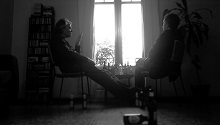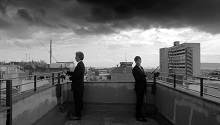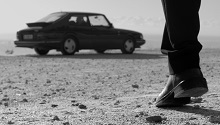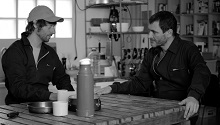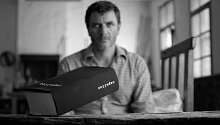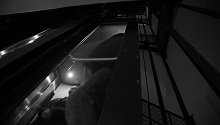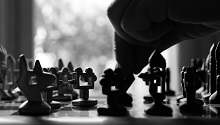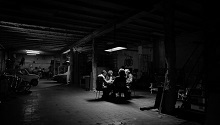No credit
No credit is a phenomenon, in the classic sense of the word. A sensory experience potentially concealing a structure that is not directly perceptible to its authors or to its potential viewers. It is entirely possible that this structure, idea or concept does not exist at all; in any case, it is the audience that will be the judge of that. However, as a phenomenon no credit does exist, and its creators wish to remain anonymous in an attempt to simulate a natural phenomenon whose meaning spectators experience at their own risk.
No credit does not respond to an established audiovisual format. It is neither a series nor, obviously, a film. It has no beginning, plot or end. The closest thing to the format of no credit could be a strip—generally of the comic variety—in a daily newspaper. Limited shelf-life and immediate consumption are inherent in the no credit phenomenon, not just in the strictly formal sense, but also as regards possible meaning.
Each piece is shot in a single day but may then be prolonged infinitely, as the stories are interlinked by their characters, though being light years apart in terms of plot.
The absence of either leading characters or funds is the consequence of its name, the origin of which is unknown.
Thanks:
Adrià Lorente – Albert Brasó – Albert Cucurella – Albert Royo – Andreu Rabal – Alex Brendemühl – Alex Ferré – Capa – Carlos Pericás – Colectivo Bajel – Costume – Eduardo Díaz – El Ranchito – Factoría Heliográfica – Fèlix Bonnin – Germán Cañellas – Guillermo Orbe – Joan Bosch – Joan Saura – Jordi Royo – Juli Rabal – Lalo García – Lastcrit – Lidia Roure – Lola Martínez de la Pera – Luis Blanco – Manel Frasquiel – Manolo Quirós – Marga Domingo – Mar Josa – Martí Llorens – Mercurio Sobocki – Moncho Sánchez-Gómez – Nacho Codinach – Nacho Rodado – Nao Cinematogràfica – Nona Permanyer – Pablo González – Pascale Bunink – Polart Digital Sound – Rafel Forga – Raimon Lorda – Raimon Rifé – Rebecca Mutell – Sadilsa – Tallers 22 – Toni González – Txell Sabartés – Víctor Cuadros – Voodoo Productions – Wetplatewagon
www.nocredit.es
NO CREDIT
At the beginning of Civilization and Its Discontents, Freud recalls that suffering threatens us from three directions: from our own body, from the external world and, no less importantly, from relations with other human beings. He continues: “It is no wonder if, under the pressure of these possibilities of suffering, men are accustomed to moderate their claims to happiness […] a man thinks himself happy merely to have escaped unhappiness or to have survived his suffering, and if in general the task of avoiding suffering pushes that of obtaining pleasure into the background.”
This distress in the face of life’s possible misfortunes sometimes turns it into an absurd parade of anxiety and boredom. Something of this absurd parade is what the pieces in no credit set out to reflect. Concentrated capsules of fiction, austerely filmed in black and white, directed according to the conventions of the dialogue filmed. No prizes for guessing that the collective’s members come from a professional background of fictional cinema. They cite Jarmusch and early Lynch as the project’s initial references. The sound of guitars in the minimal music accompanying all the pieces are reminiscent of Laura Palmer. They share with Tarantino a liking for black suits and guns.
They say the group is the product of a desire to tell stories without having to pay the costs of commercial cinema. With technological advances, today’s media make it possible; this is what they call the democratization of the audiovisual world. So it was that no credit started to produce a kind of minimum stories (as they were dubbed by Javier Tomeo, with whom they share a liking for the absurd), or audiovisual comic strips, as they aptly term them. These pieces represent a search for freedom of format, renouncing the obligations that the commercial audiovisual world continues to impose, though some progress is being made on that front. Never enough for us. The scripts are specially written for the characters who are to act them out.
The themes of no credit are the miseries of the body, death, loneliness, guilt feelings, suicide, and work (or, rather, business), competition, insult… One piece uses fishing as a metaphor for the absurdity of waiting, for a life that is no life. Another reminds me of a French proverb that says that with the years, the heart moves to the right. Though not long ago, in the museum of anatomy of a Medicine Faculty in Madrid, I learned that it is impossible (or very difficult) to live with your heart on the right, unless all the other organs are inverted.
Sometimes they are dialogues of the deaf, of people straitjacketed by egoism, which are no less disturbing for being familiar. Dialogues that are like two people talking at each other in a claustrophobic atmosphere. Dialogues of individuals who may repent—too late—of having chosen a grey and boring life above a different one, full of passion and adventure, with its possible upheavals and upsets.
Félix Pérez-Hita (Video artist and cultural critic)


